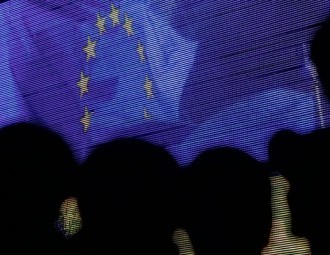Andrei Yahorau: Belarus-EU cooperation has improved, while European perspectives are put off

This paradox is the result of the thaw that is appearing in Belarus-EU relations, which, however, can end with the repeat of the situation of 2010 election.
The European Union agrees to cooperate with Lukashenka’s regime because of apprehensions that Belarus might become fully controlled by Russia. However, return to the situation of 2008-2010 won’t help to predict the situation in Belarus – dictatorships are unpredictable. Moreover, there is high possibility that the situation of the 2010 president election will be repeated: even if there are no mass repressions after the election, they will come at a different time and on a different occasion.
Andrei Yahorau, the director of the Center for European Transformation, commented upon the thaw in Belarus-Europe relations and its possible consequences to “EuroBelarus” Information Service.
- Belarus-Europe relations are slowly but surely are experiencing déjà vu: Belarus and the EU are close to repeating the thaw of 2008-2010. How big is the chance that the official Minsk will manage to do it for a second time without making any effort at all, as political and economic reforms in the country aren’t even made for show?
- The reasons of the thaw in Belarus-EU relations don’t have to do with the change of situation in Belarus. Ukrainian situation has partially influenced rapprochement between Belarus’ and EU’s interests. Now the EU finds it more important for Belarus to retain sovereignty and at least some neutrality in the situation of regional geopolitical conflict between Russia and the EU. I.e. the EU agrees to cooperate with this regime because of apprehensions that Belarus might become fully controlled by Russia.
Besides, all the former policy of the EU aimed at some positive changes n Belarus brought low results. Neither the involvement of 2008-2010 gave anything nor the following freeze in relations were of use. But the EU doesn’t want to make a principal change of approaches and look for new strategies of work with Belarus, that is why we see habitual swing from isolation to certain “cooperation”. Now Minsk demonstrates minimal loyalty to the EU and readiness to resume negotiations with it, which is enough to start conversation for the EU at this stage.
- Restoring its relations with the EU, Belarus is trying to protect itself from the more aggressive behavior of its main ally – Russia, and if it’s lucky – to exploit Europe, too. Lukashenka is unable to make geopolitical turn towards Europe. But what is Europe trying to achieve? What for is the EU ready to strengthen Belarusan dictatorship with its own hands?
- Europe wants the same as it has always wanted: stability and predictability of inner situation in the countries neighboring with the EU. It doesn’t need chaos and shocks, poverty, sources of illegal migration, terrorism, wars, suppression of some population groups, and other disasters at its borders. However, it’s too naïve to assume that the return to the situation of 2008-2010 will help to achieve predictability regarding the situation in Belarus. Dictatorships are unpredictable and always generate these or that excesses.
- The former thaw ended in a bloody Sunday. Eurosceptics are convinced that we are to expect the same fate during this thaw, too. Is the EU ready to pass Belarus at the mercy of Lukashenka for the sake of its geopolitical interests?
- The repeat of the situation with the president election of 2010 is very likely to happen. And even if there are no mass repressions after the election, they will come at a different time and on a different occasion. Authoritarian and dictatorship regimes are repressive in their essence, and the EU will have to react to that. But how? There are no other variants apart from sanctions, that is why new freeze of relations will take place and the cycle will be repeated. However, the EU won’t give up Belarus to Lukashenka directly; it will aim at transforming this regime is a more liberal one. The other thing is that the EU doesn’t know how to do it.
- The civil society and the opposition are basically excluded from the Belarus-EU relations. What can they do so that to avoid repetition of 2010 both in the Belarus-Europe relations and inside the country?
- Civil society has to seek greater spread of its influence in the country, become more coordinated, consolidated in its actions. It also applies to its position on the Belarus-EU relations. To a large degree the EU is guilty for its own troubles, as it turned to be unable to find compromise and common position after 2010. Being separated, we have given foreign actors and the regime an opportunity to play on that or simply ignore the opinion of the civil society. Now we still can reduce the risks of repetition of 2010 by merely avoiding the election. At least it can reduce the election “fever” and bring back the democratic camp to discussion of questions that matter.
- What European perspectives have Belarus preserved?
- It has preserved all its perspectives. However, in the current situation they are delayed. I.e. cooperation of Belarus with the EU has improved, while European perspectives have been postponed. This is the paradox.
The new cycle of involvement, without the critical review of the former period is bound to be unsuccessful. We need new grounds, new political instruments, and new approaches.
-
03.01
-
07.10
-
22.09
-
17.08
-
12.08
-
30.09








































